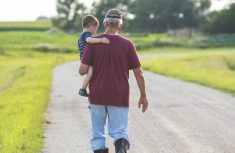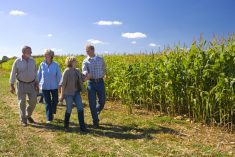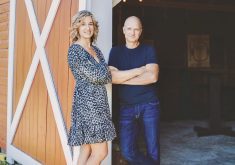Take a look across the country and you’ll see myriad ways that farmers become farmers, and just about as many opinions on the right way and the wrong way to go about it.
Good farm succession advice is abundant, as well as checklists to work through, seminars to attend, and even government resources to help fund the process, all with the goal of ensuring that your succession is smooth and seamless, rather than fraught with emotion and drama.
Even with all that advice, though, a lot still depends on the personalities and families involved, as well as on their business skills as communicators, managers and planners.
Read Also

Riding the tariff rollercoaster
Farmers are accustomed to roller-coaster years. But the current geopolitical windstorm is something else entirely. On his cattle operation near…
But farm families also know that succession planning is a process than can span many years, even decades, as the knowledge, control and ownership gets transitioned from one generation to the next.
Is there a right way, wrong way or better way to prepare for this process?
Equally important, is that way the same way as a few years ago, before the bull market, when farm parents would encourage their children to look for off-farm opportunities, and when farming seemed full of difficulties and uncertainties that might be wisely avoided with a good job in town.
In many cases, an off-farm job was needed even for children who planned to farm, because the farm didn’t generate enough cash flow for two generations at the same time.
Now the situation has come almost full circle. Farming is a truly viable option — just look at how farmland values have sky-rocketed, reflecting the optimism within agriculture. Farming has also gained in stature as a career, and many families are working hard to grow their businesses into enterprises that will be able to sustain the next generation as well as any off-farm career might.
More skills, more skillfulness
Tracy Court, Plumas, Man.
“I never wanted to farm,” says Tracy Court, agronomist and business partner with her parents in Court Seeds and Greenhouses at Plumas, an hour northwest of Portage la Prairie. “I never worked on the farm growing up and I never had any interest in becoming a farmer.”
“Honestly,” says Tracy, “growing up, I could never understand why anyone would want to work that hard for that sort of return.”

Tracy describes getting into agriculture as an accident. “I loved chemistry and biology in high school,” she explains. “Food science seemed like a good combination for me with some excellent job opportunities after graduation. I didn’t know at the time that the food science department was in the agriculture faculty at the University of Manitoba.”
It proved a critical coincidence. Being a farm girl, she naturally became friends with others from the farm in the faculty. By her second year, she started to really get into the food science core courses and surprisingly, she didn’t like it and started to look for other options. “My friends were taking agronomy and business courses in agriculture and it seemed a lot more interesting than making acidic solutions or whatever I was doing, so in third year I switched.”
Tracy graduated in 2008 with a four-year degree in agriculture with a major in agronomy. “During my summers in university, I worked at Kelburn Farm for Richardson’s,” says Tracy. “That was my first real, hands-on farm job.”
She also worked for Bayer CropScience at their Portage research farm, and after graduating, she moved to Lethbridge for a summer job with Monsanto as a canola seed production agronomist — which then became a full-time job. But by then she was thinking of new challenges. “That’s when I moved to Hudye Soil Services,” Tracy explains. “I did trial work, independent crop scouting and had some retail responsibilities.”
“I still wasn’t thinking about farming,” Tracy recalls. “I still saw a lot of risk and long hours, plus I didn’t have a lot of experience — nor could I fix a tractor.”
The job at Hudye Soil Services, however, turned out to be the best experience to help her with her decision. She did most of the extensive trial work that Hudye conducted every year. She also honed her agronomy skills with the crop scouting aspect of the job.
After two seasons with Hudye, the conversations about moving back to Plumas to farm with her parents started. “My dad was excited, and nervous,” laughs Tracy. “He wanted me to farm with him, but he also didn’t want me to become stuck on the farm, nor did he want to pressure me in any way. And in many respects, it’s still a bit of an experiment. We’re still figuring it out.”
From the Grainews website: Keep the farm going
Back to the farm
“I’ve taken over most of the farm planning, the agronomy management and the crop scouting as well as being involved in the day-to-day operations,” says Tracy. “Now Dad is freer to focus on other projects, new investments, other business opportunities and networking, which is what he loves to do.”
The farm is now operated by a management team consisting of Tracy’s parents Randy and Jeanine, and Tracy. The Court farm is a business first and foremost, and it’s run that way.
“Jeanine and I always ran our farm as a business,” says Randy Court, first generation farmer and partner with his wife Jeanine and now daughter Tracy in Court Seeds & Greenhouses. “It’s because we built it from nothing to what it is today.”
Randy and Jeanine always encouraged both their children to get good educations and to follow their dreams wherever they led. In the case of their son it took him to Calgary, Alta., and a career in computer programming.
“I think Tracy came to realize that she wanted to (a) work for herself and (b) work in agriculture,” explains Randy. “The natural intersection of those two desires was to farm herself. Then the leap to become a partner with Jeanine and me in the farm wasn’t that great.”
Randy himself is a cat of a different colour — starting the farm as a city boy fresh out of university and newly married. Jeanine too built up the greenhouse side of the business and ran two retail garden centres in Neepawa and Gladstone for 25 years. Entrepreneurship obviously runs deep on both sides.
According to farm succession experts, often the biggest hurdle to the young farmer joining the farm business is the handover of not only the production work, but the management and decision-making. For the Courts, this seems to have been a smooth transition.
“Tracy brings her skills and experience to the table and between us, we’ve divided up the management roles,” says Randy. “We are together and discussing our plans all the time, but Tracy has her responsibilities around crop planning, agronomic decisions and so on, and I am responsible for variety selections, investment planning with equipment and land, human resources and so on.” Marketing and sales are joint responsibilities.
What the Courts have found is that having Tracy join the team has opened up new business opportunities. “She’s also brought a tremendous energy and enthusiasm back into our business,” says Randy. “I have increased motivation now to explore opportunities, and of course, I have the time to do it as Tracy takes over more and more of
From the classroom to the tractor
Gary Lenderbeck, Roblin, Man.
Gary is the youngest of three boys born to Don and Gaye Lenderbeck, and he took a direct and focused route to farming. “I’ve loved farming since I can remember,” says Gary. “I knew this was what I was going to do. I came home in the summers from university to work on the farm and I hated having to go back in the fall, so coming straight back to the farm after I graduated just made sense to me.”
Gary saw university as a good way to upgrade his skills and knowledge. “I was aware of many opportunities while I was at university, but I wanted to come home to farm while I was still young,” says Lenderbeck. “I don’t have far to look back yet, but I feel like I’ve made the right decision.” Gary majored in agronomy, which he thought would be the most helpful to his mixed farming operation, taking a variety of courses in agronomy, animal production and soil science.

“I bought a half-section of land in my last year at university,” says Gary. “Land is not that easy to get in the area, so you have to strike while the iron is hot.” His goal in the short-to-medium term is to expand the amount of land he owns and reduce his reliance on rented land. “Our operation is limited in scope by labour,” Gary explains. “We are pretty much maxed out on hired help now, and with only so many hours in a day, the amount of land we can farm is capped.”
Not having worked off-farm, Gary feels he struggles somewhat with the human resource management aspect of being a young farmer. “I am young and I don’t have a great deal of experience managing staff,” says Gary. “Would working off-farm have given me management experience? No. But maybe working for a manager would have been useful.”
“I encouraged all my boys to follow their own dreams,” says father Don. “The two older boys followed their dreams to careers off the farm, but Gary always loved farming. Am I surprised he wants to farm? Not at all.”
Don’s eldest son took computer science at university and the middle son took herd management at Olds College but is now involved in directional drilling consulting.
Don and his brother both farm. They started out together but they separated things after Don married. “I like to say that we farm together, apart,” laughs Don. “We share the work, we have our own equipment and land, but we don’t share the payments.” The way the farms are situated suits this style of co-operative farming. Their combined land runs north to south across a valley, with the southernmost land usually ready for seeding first, and staying about one week ahead throughout the season.
Don doesn’t feel his son is trapped by his decision at such a young age to buy land, believing the land has increased in value over the years since. He also feels Gary is learning from himself and his uncle and that not having the off-farm experience won’t hold him back.
“The biggest concern I have is that we farm in a fairly isolated area,” says Don. “We’re over 30 minutes from the nearest small town… there’s not much in the way of a social life for a young man around here.”
Being able to socialize with people his own age and have the opportunity to date is not something most young people have to worry about, but it is an issue for Gary. “In that respect, this is a hard life, that’s for sure,” says Don. “I would hope that drawback doesn’t deter Gary from his dream.”















